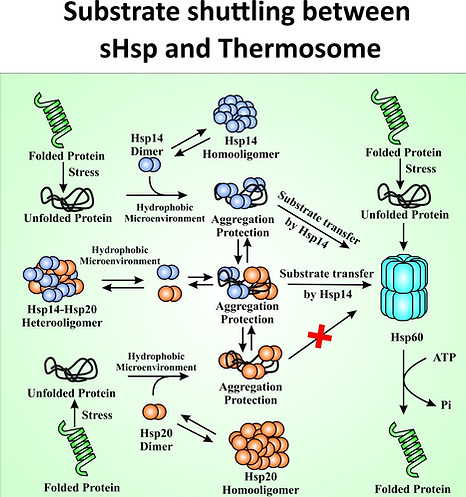Abhrajyoti Ghosh Lab

Recent Publications

This research enhances our knowledge of toxin-antitoxin (TA) systems in archaea, specifically in the thermoacidophilic archaeon Sulfolobus acidocaldarius. TA systems are widespread in both bacterial and archaeal genomes, indicating their evolutionary importance. However, their exact functions in archaeal cellular physiology are still not well understood. This study sheds light on the complex roles of TA systems and their critical involvement in archaeal stress adaptation, including persistence and biofilm formation. By focusing on S. acidocaldarius, which lives in habitats with fluctuating temperatures that can reach up to 90°C, the study reveals the unique challenges and survival mechanisms of this organism. The detailed biochemical analysis of the VapBC4 TA system and its crucial role during heat stress provides insights into how extremophiles can survive in harsh conditions. The findings of this study show the various functions of the VapC4 toxin, including inhibiting translation, inducing persister-like cell formation, and regulating biofilm formation. This knowledge improves our understanding of TA systems in thermoacidophiles and has broader implications for understanding how microorganisms adapt to extreme environments.

This study explores the group II chaperonin Hsp60 complexes from thermoacidophilic crenarchaeon Sulfolobus acidocaldarius. Substrate recognition by Hsp60 relies on hydrophobic interactions, followed by ATP-dependent refolding through charge-driven interactions. Hsp60β complex protects membranes from stress induced disruption. It exhibits nested cooperativity in ATP hydrolysis, combining MWC and KNF types. Hsp60β and Hsp60αβ complexes display a mosaic behavior during ATP hydrolysis, bridging group I and II chaperonins, becoming a functional mosaic.

We investigate the role of actinobacterial isolates for studying their effects on induced systemic resistance (ISR) in maize. The study found that bio-priming with actinobacterial isolates primarily modulates the jasmonic acid (JA) pathway over the salicylic acid (SA) pathway. Bio-primed maize plants experienced delayed disease progression by the pathogen Ustilago maydis. This research highlights the potential of using actinobacteria as an eco-friendly alternative in agriculture to improve plant health.
_edited.jpg)
We investigated the cross-stress adaptation of Sulfolobus acidocaldarius for the first time by studying the expressions of Hsps, TA system and transcription factors. We identified some key molecular players involved in mitigating cross-stress.
